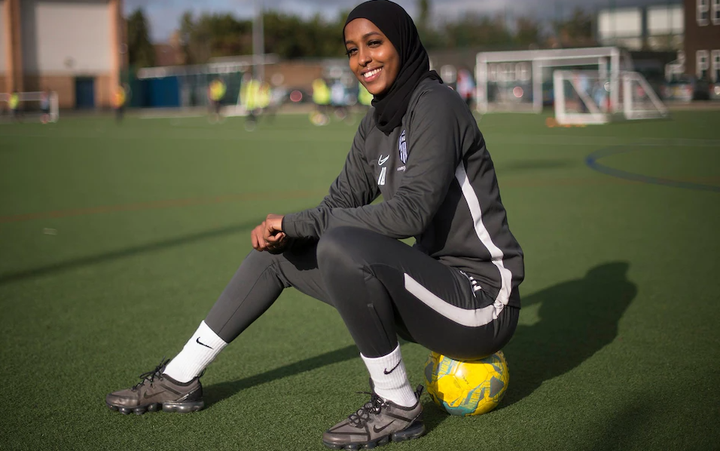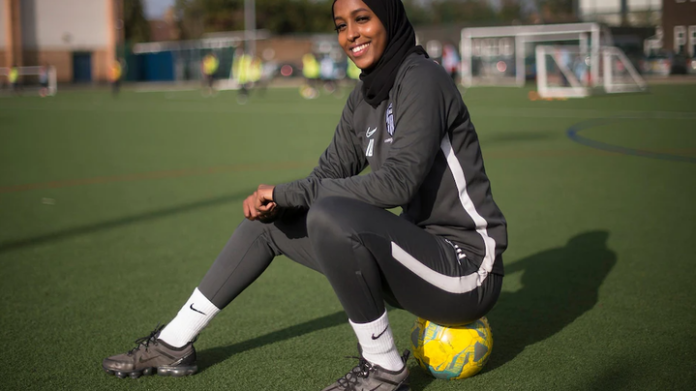In a recent incident highlighting the challenges of balancing sports regulations with religious inclusion, Iqra Ismail, a football coach and former captain of the Somalia women’s national team, was prevented from playing a match because she wore tracksuit bottoms instead of shorts. The incident, which occurred during her debut game for United Dragons FC, has sparked conversations about the need for more inclusive policies in football.

Iqra, a 24-year-old footballer from west London, was prepared to play in a Greater London Women’s Football League (GLWFL) match on Sunday. However, she was told by the match referee that she could not participate unless she wore the club’s official shorts. Despite already warming up and preparing to enter the game at halftime, Iqra was pulled aside and informed that her tracksuit bottoms were not acceptable.
“I’ve been playing in this league for almost five years wearing the same tracksuit bottoms, and I’ve never worn shorts competitively,” Iqra told the BBC. “I was really shocked by the referee’s stance. I told him I wasn’t comfortable wearing shorts, but he still insisted. I was visibly upset.”
Iqra, a Muslim woman, has always worn long sleeves, a sports hijab, and tracksuit bottoms to respect her religious beliefs. She explained that many other Muslim women avoid competitive leagues because of discomfort with wearing shorts, despite their ability and passion for the sport.
“This is not just about me—it’s about other women who are capable of playing but are deterred by uniform requirements that conflict with their beliefs,” she said.
While the Football Association (FA) permits players to wear clothing aligned with their faith, including trousers, official rules state that goalkeepers are the only players allowed to wear tracksuit bottoms. Iqra’s exclusion reflects a miscommunication between league policies and the referee’s enforcement on the day of the match.
Following the incident, the GLWFL released a statement clarifying its understanding of the rules. Initially, it believed players were required to wear shorts over tights or tracksuit bottoms to comply with club colours. However, the league has now acknowledged that this interpretation was incorrect.
“We have since learnt that match officials should allow players to wear trousers to ensure they feel comfortable,” the statement said. “We will be updating our guidance to all referees and teams to avoid future incidents like this.”
“We proactively communicated earlier this year to all county FAs and match officials that women and girls should be allowed to wear clothing aligned with their religious beliefs. We remain committed to ensuring football is a welcoming environment for everyone.”
For Iqra, the incident was a painful setback in her ongoing efforts to promote safe spaces for Muslim women in football. Over the past few years, she has worked as a coach and advocate to encourage Muslim women to participate in the sport.
“It feels like one step forward, two steps back,” she said. “We’ve been trying to create a space where Muslim women feel welcome, and incidents like this undo that progress.”
She cited her work organising women-only, alcohol-free viewings of the FA Cup final as one example of how the community has tried to make football more accessible. “Your faith and comfort should come first,” she added. “People say you’re just a player when you step onto the pitch, but I believe you should be able to bring your identity and culture with you.”
The incident involving Iqra Ismail highlights ongoing challenges in the world of sports, where uniform policies sometimes conflict with players’ personal beliefs. While the GLWFL has pledged to revise its guidelines, the situation underscores the need for clear, consistent rules to ensure that faith-based barriers do not exclude anyone from the game.
For Iqra, the hope is that her experience will lead to lasting change: “I want other Muslim women to know they belong in this sport. It’s about more than just football—it’s about inclusion, identity, and respect.”
Source: BBC NEWS
